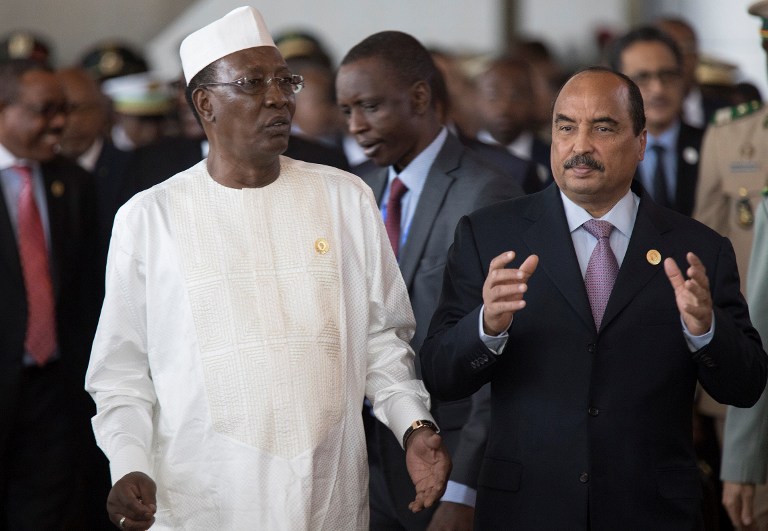

African Union leaders meet in Ethiopia on January 30 for a difficult summit likely to expose regional divisions as they debate whether to allow Morocco to rejoin the bloc, and vote for a new chairperson. / AFP PHOTO / ZACHARIAS ABUBEKER
by Fran BLANDY
Agence France-Presse
ADDIS ADABA, Ethiopia (AFP) –
African Union leaders grappled with Morocco’s divisive bid to rejoin the bloc at a summit Monday and sounded alarm for the continent over US President Donald Trump’s immigration ban.
“The very country (where) our people were taken as slaves… has now decided to ban refugees from some of our countries,” outgoing AU Commission chair Nkosazana Dlamini-Zuma told some 37 heads of state and leaders from across the continent.
“It is clear that globally we are entering very turbulent times,” she added.
Trump’s administration has faced outrage and widespread protests over the move to ban citizens from seven countries including Libya, Somalia and Sudan in Africa.
In his opening address at the summit, new UN Secretary General Antonio Guterres didn’t mention Trump’s refugee and travel ban specifically, but criticised the closure of borders “even in the most developed countries in the world.”
All eyes at the summit are on a bid by Morocco to return to the fold 33 years after it quit in protest against the AU’s decision to accept Western Sahara as a member.
However proceedings began with the swift election of Chadian Foreign Minister Moussa Faki Mahamat, 56, as the new chairperson of the AU Commission, beating four other candidates.
A less bureaucratic AU
Faki won in a final battle against his Kenyan counterpart Amina Mohamed after seven rounds of voting, the Kenyan government said in a statement, praising a “valiant race” by their candidate.
Faki takes on the role as his country’s President Idriss Deby Itno hands over the rotating presidency of the AU to Guinea’s Alpha Conde.
Faki, a 56-year-old former prime minister, has been at the forefront of the fight against Islamists in Nigeria, Mali and the Sahel and has promised “development and security” will be top of his agenda as chief of the 54-member continental bloc.
He said he dreams of an Africa where the “sound of guns will be drowned out by cultural songs and rumbling factories” and pledged to streamline the bureaucratic AU during his four-year term in office.
AU reforms
Faki takes over from South Africa’s Nkosazana Dlamini-Zuma who is credited with advancing women’s issues and moulding the ambitious Agenda 2063, but is seen to have dropped the ball on peace and security while focussing on personal political ambitions back home.
The choice of a new leader is crucial for the future of a bloc which is undergoing deep introspection on how to reform to become more relevant and better respond to crises on the continent.
Tasked with leading the reforms, Rwanda’s President Paul Kagame delivered a “biting” report to heads of state on Sunday, according to a statement from the Kenyan government.
He criticised “chronic failure to see through African Union decisions (which) had resulted in a crisis of implementation and a perception that the AU was not relevant to Africans”.
Kagame also slammed “over-dependence on (donor) funding” which accounts from 70 percent of the AU budget, according to the Institute for Security Studies.
Moroccan money
The membership of affluent Morocco could be a boon for the AU, which lost a key financier in late Libyan dictator Moamer Kadhafi and is working on ways to become financially independent.
A Moroccan diplomat said Sunday the country had the “unconditional support” of 42 members of the bloc.
However in a sign of the resistance Morocco is facing, 12 countries including heavyweights Nigeria, South Africa, Algeria, Kenya and Angola, requested a legal opinion from the AU on whether the bloc could accept a member that is “occupying parts of the territory” of another member.
These nations have long supported the campaign for self-determination by Western Sahara’s Polisario movement.
Morocco maintains that the former Spanish colony under its control is an integral part of the kingdom, while the Polisario Front, which campaigns for the territory’s independence, demands a referendum on self-determination.
The AU’s legal counsel, in a document seen by AFP, said the nations raised “fundamental concerns that have to be taken into account”. However the decision to weigh Morocco’s request ultimately rests with heads of state.
